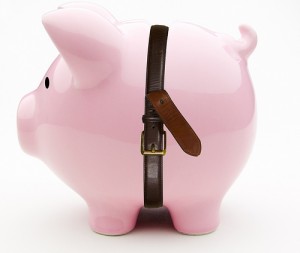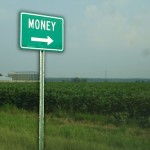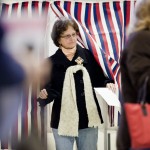Why Candidates Are Spending Less On The NH Primary This Cycle–And What It Could Mean For The Future

Alex Wong / Getty Images
The 2012 Republican presidential candidates just aren't investing as much in the New Hampshire race as usual. StateImpact scours political coverage to find out why.
There’s been a collective notion swirling among New Hampshire politicos and pundits that this year’s Republican primary just doesn’t stack up to past events. Candidates aren’t as anxious to go to town hall meetings and shake hands at nondescript diners. By and large, they’re not throwing astronomical sums of cash into unending TV ads. Yes, they’re here, touting the importance of the early New England vote. But they’re not entirely here, mentally and spiritually grounded in the Granite State, outwardly embracing its quirks, touting its special place in electoral politics (except for Jon Huntsman, that is) .
In short, there’s a well-documented sense in the media that somehow, somewhere along the line, New Hampshire’s First In The Nation primary has fallen off its granite pedestal.
The problem with nebulous sentiment, however, is that it’s tough to quantify.
So instead, we’re going to take a look at some of the latest coverage concerning political spending and the decline of retail politics to get a more solid sense of what this perceived shift could mean for New Hampshire.
What Primary Spending Looks Like Now
Let’s start off with a picture of early primary spending. Back in December, StateImpact pointed our readers to an article by Bob Sanders at the New Hampshire Business Review. Sanders wrote:
“As of Sept. 30, the Republican candidates have spent a total of $4.6 million directly in New Hampshire — about 36 percent of the amount spent by candidates in 2008. Yes, there were races in both parties that year, with 13 major primary candidates, but this year there are 10 major GOP candidates — or eight, if you go by the deciders of debate participants. And that should mean at least more than half of the amount spent four years ago. Final spending figures won’t be available until after the primary.
In 2008, when all was said and done, candidates in both parties spent $21.1 million in the state. Republicans alone spent $12.1 million, but almost all of that is spent on consultants, fundraising and staff.”
Of course, that only takes us up to the end of September (when there was also a larger slate of presidential contenders). Between October and Primary Day on January 10, one would expect TV ad buys, at least, to pick up steam as the contest heated up.
Except, as NHPR’s Jon Greenberg recently reported, they didn’t:
goodbanta / Flickr
This year's slate of candidates isn't relying as heavily on high-dollar TV ads as contenders of primaries past
“In the closing hours of the primary, the campaigns are turning to the airwaves to make one last push for votes. About a third of the electorate say they have yet to make up their mind. Some 60 television ads a day might help them decide. That might sound like a lot but the real story of advertising in this primary is, there’s so little of it.
Two candidates have dominated the New Hampshire television market for several months. Texas congressman Ron Paul, often cast as a firebrand, is now running an ad aimed at burnishing his image as a reliable leader…
In these final days, combined, the two campaigns and their super PAC supporters account for more than half of all the political ads on WMUR at a cost of about a third of a million dollars. That’s small potatoes in the world of presidential politics.
Greenberg also cites Republican media consultants Pat Griffin and Brad Todd in his piece. Griffin cites the Mitt Romney’s continued dominance in the state as one deterrent to other candidates throwing money into regional media. And Todd notes that since the state is dominated by Boston-based TV stations (with the exception of WMUR), the cost of competing with Mitt Romney’s well-funded machine is extraordinarily high.
Traveling NH On A Shoestring Budget
So TV ad buys are down…but what about other campaign spending? According to Michael McCord’s reporting at SeacoastOnline.com, political TV commercials represented 80 percent of the primary spending pie back in 2000 (we’ll have more on that in a minute). So not having to sit through interminable campaign ads isn’t the good news New Hampshire voters might think it is.McCord also reports that campaigns have been rather tight when it comes to non-media spending as well:
“The most recent quarterly campaign filings from November show a few five-figure expenditures in the region — the Mitt Romney campaign spent $15,000 for an event at the Wentworth by the Sea hotel in New Castle and the Huntsman campaign spent $10,000 at the Exeter Inn — but most of the spending was more modest. The campaign of Rick Perry spent $400 for an event at One Liberty Lane in Hampton and Ron Paul’s campaign reported spending $511.29 at the Courtyard Portsmouth hotel.”
Putting Today’s Primary Spending Into Context
Then, McCord draws our attention to something that seasoned New Hampshire political-types consider something of an old chestnut–a report written by economists Ross Gittell and Brian Gottlob examining the economic impacts of the 2000 primaries.
Ken Teegardin / Flickr
While GOP candidates aren't exactly breaking the bank in NH, a study of primary economics shows they never really did, anyway
“The study was commissioned by the New Hampshire Presidential Library and Gittell and co-author Brian Gottlob emerged with results that challenged the conventional wisdom of the economic impact of the presidential primaries.
‘They were surprised by our findings,’ Gittell said. What was surprising is that the economic impact, ‘while not insignificant,’ he said, was limited. ‘What tended to happen is that people saw all the activity and that there were economic benefits,’ Gittell said. ‘But we found it was not as significant as people expected.'”
While we couldn’t track down the original white paper online, we did manage to turn up a PowerPoint presentation by Gittell and Gottlob. You can check out the whole document below. But for our purposes, here are the most relevant numbers:
- Between 1996 and 2000, primary spending went up by 50 percent, from $210 million to $306 million.
- For the 2000 primary, direct campaign spending was $12 million.
- Direct spending by media organizations and visitors was $71 million.
- Between direct, indirect, and induced spending, total primary spending in 2000 was $231 million.
- The “total economic benefit” to the state, from March 1, 1999 to February 28, 2000 was $264 million.
- That year primary spending was directly responsible for 1,511 jobs, indirectly responsible for 255, and induced a further 467. That works out to 2,248 jobs related to primary spending.
When you compare $12 million direct campaign spending in 2000 and $12.1 million among Republican contenders in 2008 to $4.6 million by September 30 2011…that leaves candidates with a lot of catching up to do. As Bob Sanders at the New Hampshire Business Review noted, the final numbers won’t be available until after the primary’s wrapped-up, but if reports of low campaign spending and tepid media buy figures hold true, it looks like the 2010 primary will have (much?) less of an economic impact than usual.
Why The Debates Matter To NH’s Political Economy
Although the economic impacts of New Hampshire’s First In The Nation status aren’t enormous, they aren’t exactly pocket change, either. So the big question is: Is this limited spending a function of an oddball political season in a down economy, or is it more in line with what we can expect during future primaries?
And that question is related to another change in this year’s political landscape: The never-ending round of Republican debates. As Jake Berry of the Nashua Telegraph reports:
Alex Wong / Getty Images
The heavy debate schedule--and the free national exposure that came with it--could have had a negative effect on NH's primary economy this season
“The [debates] have given the candidates greater national exposure, drawing millions of viewers from across the country. But analysts fear they have collectively contributed to a declining rate of candidate appearances and grassroots campaigning in the first-in-the-nation primary state.
‘There’s no doubt there’s been an effect. We just have not seen the same level of engagement (from the candidates),’ said James Pindell, political director at WMUR-TV in Manchester, which cosponsored and aired Saturday’s debate.
‘It’s definitely seductive. It allows candidates to get very high-profile coverage for free,’ said Dean Spiliotes, a professor of political science at Southern New Hampshire University. ‘That hasn’t necessarily been good for New Hampshire.’
While the number of debates has increased, the number of candidate appearances in New Hampshire has fallen in turn this primary season, analysts agreed…
This is likely because of a confluence of factors, the struggling economy not least among them, said Spiliotes, author of the blog NHPoliticalCapital.com. But the increased number of debates has also weighed heavily.
‘For a number of candidates, (the debates) became a substitute for actually doing the retail politicking, grass-roots organizing and fundraising you need to do,’ he said.”
In other words, while low primary spending could certainly be related to the down economy or Romney’s dominance in the New Hampshire polls, there could be another force at work. And that’s contests shaped less by the TV time you buy and the hands you shake, and more by the free exposure that comes from duking it out with your competitors in free debates…over, and over, and over again.
You can check out the presentation we mentioned earlier (by Ross Gittell and Brian Gottlob about the economic impacts of the 2000 NH primary) below:





